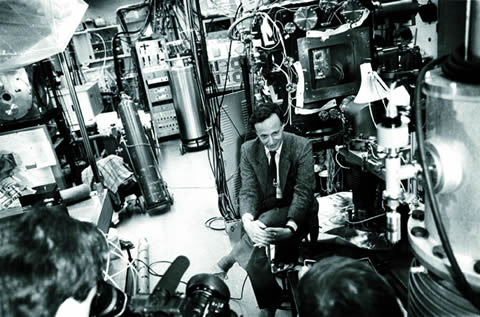1986
On the morning of October 15, 1986, Professor John Polanyi was awakened by a news service phoning to ask him what he had won the Nobel Prize for. This was no prank call: It turned out that Sweden’s Nobel Foundation had awarded the prestigious prize to Polanyi, along with two other scientists, for their work in chemistry. In his acceptance speech in Stockholm, Polanyi shone the spotlight on science itself. “When, as we must often do, we fear science, we really fear ourselves,” he said.
The equipment in this photo consists of “high-vacuum chambers in which we channel molecules to see if they exchange atoms when they collide,” says Polanyi. His casual explanation belies the decades of research that preceded his Nobel win. By measuring infrared light emitted by reacting molecules, Polanyi and his team came to understand the motions of atoms in that fleeting instant when chemical reactions occur – work that led to the development of the chemical laser.
The scientist has also made his mark as a public intellectual, pleading passionately against nuclear armament and war. When asked if the Nobel Prize changed his life, Polanyi draws attention away from himself. “I have a lively research group working with me, just as I had in the past,” he says. “We’re still asking questions about how molecules behave.” A salutary difference: “Modern science has provided us with wonderful new tools to examine single molecules before and after they’ve ‘changed partners.’ More than ever we can see the molecular dance in action.”
Watch a 2009 interview with Nobel Prize laureate John Polanyi:






No Responses to “ Chemical Reaction ”
Great pic. Looks like he's building a time machine!
There is a University of Toronto back story to Professor John Polanyi learning of his Nobel Prize award.
On the morning of October 15, 1986 I arrived at work. I was the manager for Canada of United Press International, then one of the world's largest news agencies.
An editor on UPI's international desk had called me that morning. He wanted to give me a head start on the news about to break that Professor John Polanyi of the University of Toronto had won the Nobel Prize in Chemistry. UPI's international desk wanted to give our office a chance to get to Professor Polanyi ahead of the competition. At that point, I knew there was an excellent chance that if I were the first reporter to reach Professor Polanyi, the honour might be mine to tell him he had won the Nobel Prize.
But how to reach Professor Polanyi quickly?
Having been a member of the alumni advisory committee of the University of Toronto Magazine, this didn't prove too difficult for me. I reached someone I knew in the university's information services and quickly obtained Professor Polanyi's home phone number.
Had I called even moments later, I suspect I might have missed speaking with Professor Polanyi. Unbeknownst to me, when I reached him by telephone he, his family and his neighbours were responding to a fire at a neighbour's house. But it would be a few minutes into the call before I would learn this fact.
I don't remember exactly what I asked Professor Polanyi, but not presuming I would be the first to tell him the news of his award it was something like: "Professor, You have been awarded the Nobel Prize in Chemistry this morning. Can you tell me about your research and how you feel about receiving this honour?"
I recognized immediately in his response that I was experiencing the rare privilege a reporter sometimes enjoys to be the first to tell good news to the person who most deserves to hear it.
Professor Polanyi was polite in answering my question, and equally polite in asking my indulgence for cutting the interview short because of a neighbour's house fire.
Well, what a fortuitous turn of events, not for the Professor, who despite winning the Nobel Prize was leaving his home as a precaution, but for me and my employer. I knew with absolute certainty that United Press International would be the first media organization in the world to carry news of Professor Polanyi's reaction to winning the prize, and it wouldn't be easily matched by some other reporter calling the professor at his home. Oh, the sheer joy afforded by dumb luck!
I filed my story. As it was being edited and breaking to the world, my associate Michael Babad -- in my view one of the finest reporters and editors in Canada -- took over the story and went straight to the Polanyi home. He conducted a more detailed interview and set the scene for what became a story inspired by, as your article was titled, a "chemical reaction."
I must also say the events of that hectic morning crystalized in my mind the calm, reason, humility and humanity of John Polanyi.
Ken Whitehurst
BA 1982 Victoria
Aurora, Ontario